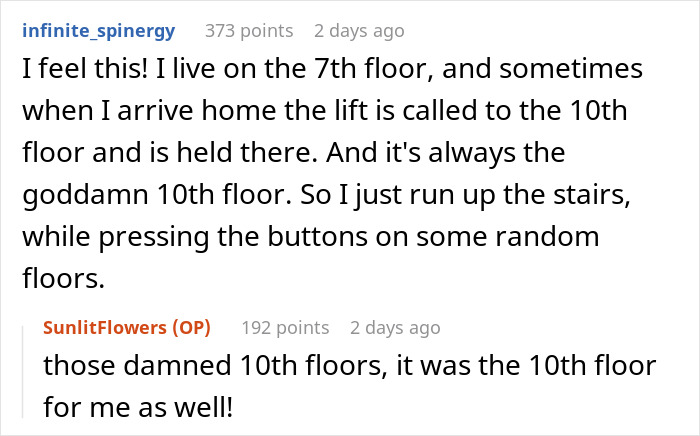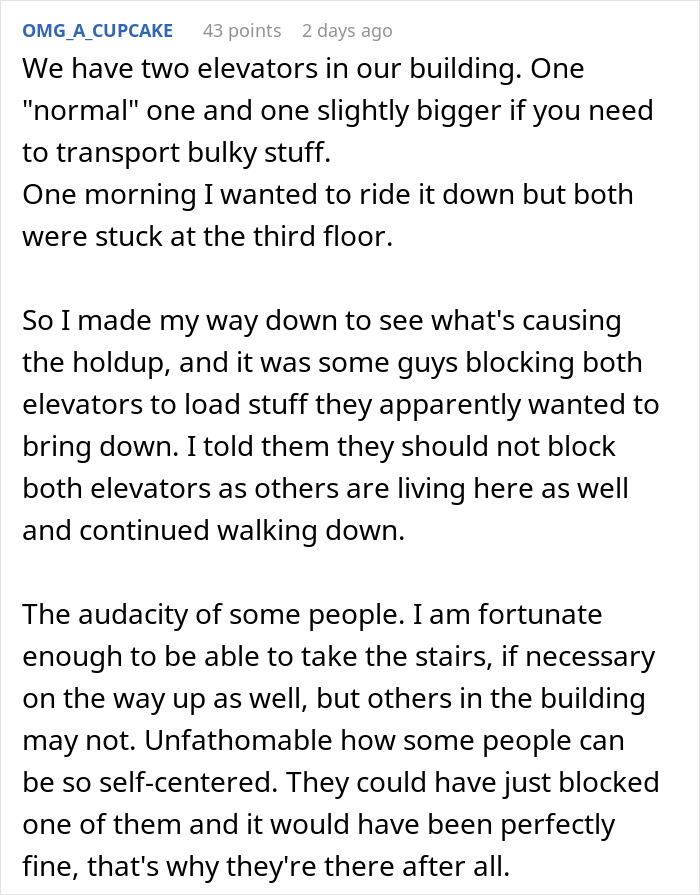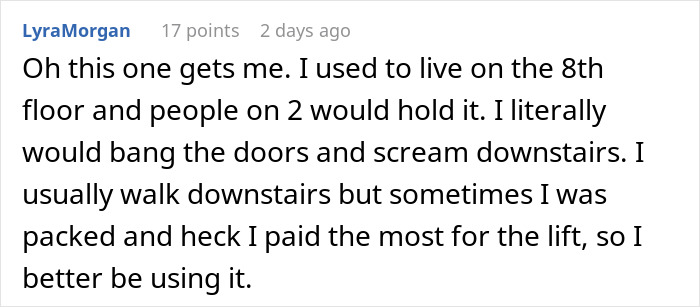I personally try to avoid elevators as much as I possibly can. Taking the stairs is so much more convenient, as you never have to wait until they’re free, and getting some extra steps in is great for your health! But there are plenty of situations where taking an elevator is a necessity.
If you’re going up 12 floors or transporting heavy boxes, you just might need an elevator. You’ll just have to hope that nobody’s holding it up! Below, you’ll find a story that was recently shared on the Petty Revenge subreddit detailing how some elevator hogs got what was coming to them after refusing to share with the rest of the building.
One of the downsides of taking an elevator is having to wait until it’s free

Image credits: maxbelchenko / envato (not the actual photo)
So when this person realized that their elevator was being held up on purpose, they decided to get revenge
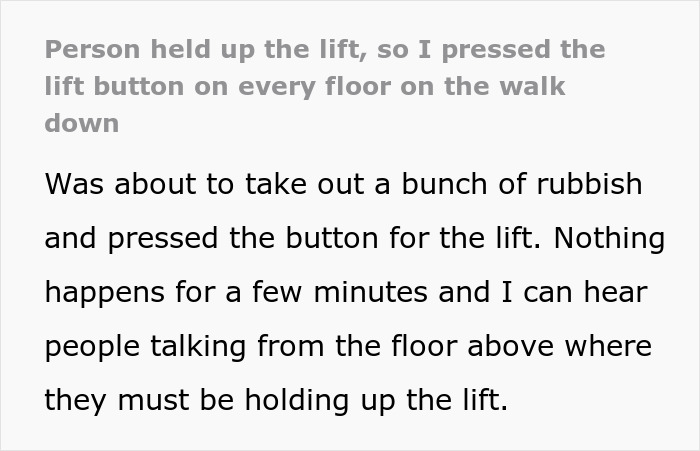


Image credits: Pressmaster / envato (not the actual photo)
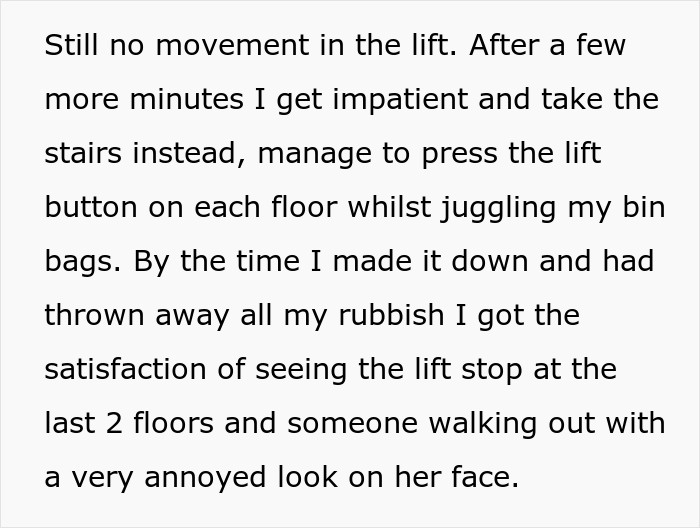
Image credits: SunlitFlowers
Later, the resident responded to a few readers and provided more info on the situation
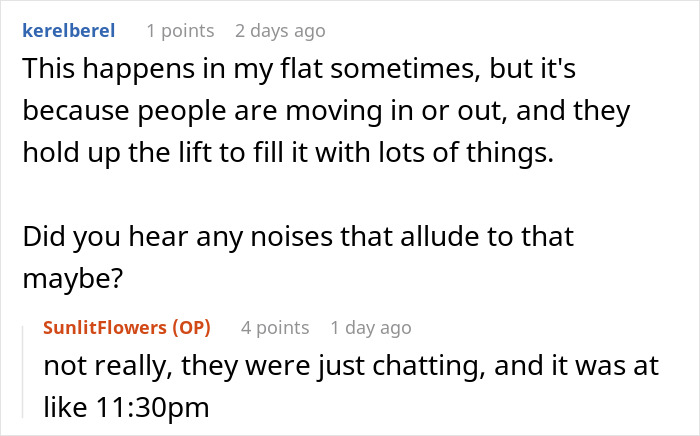
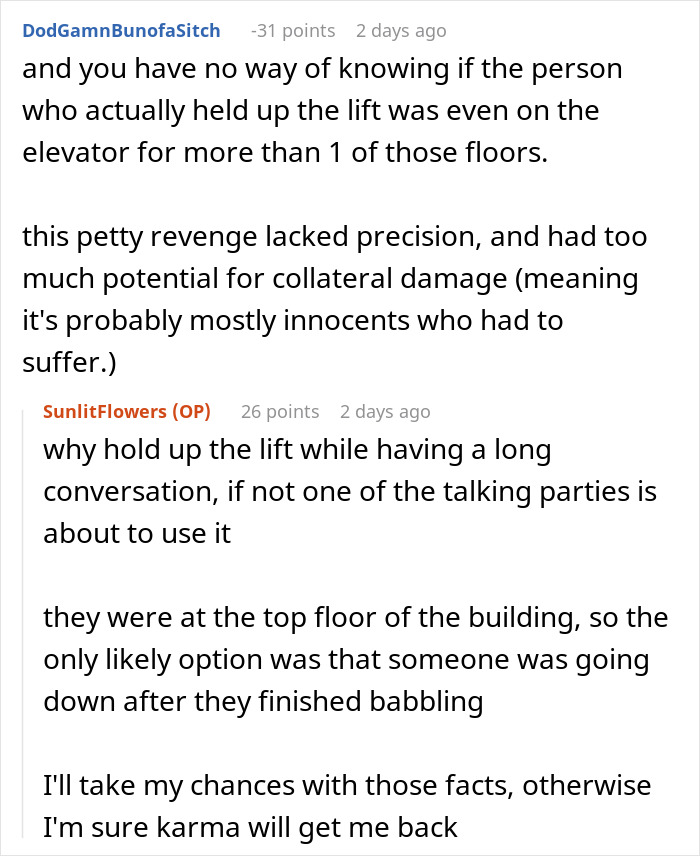

In busy buildings, elevators can be operated hundreds of times a day
I can easily go months without riding in an elevator, as I don’t have one in my building, and I don’t need to take one at work. Unless I visit a friend who lives on the 10th floor of a building or I find myself at the airport with heavy luggage, I’m opting for the stairs. (And often, it’s not even a choice. Stairs are the only option!) Most of us use elevators only when we’re traveling or working in a high-rise office building.
According to one 2021 study from Kone, the pandemic greatly affected how often people use elevators. In London, for example, office elevator use went down 80% during 2020. And in Amsterdam, the monthly average number of journeys in elevators dropped from 16,500 in September 2019 to 3,500 in April 2020. But usage has been back on the rise since the height of the pandemic.
In Chicago, for example, elevator usage in offices rose a whopping 301% between January to October 2021. Hotels also saw their elevator usage be impacted greatly by the pandemic. In September 2019, hotels had an average of 22,000 uses per elevator. Yet by April 2020, this dropped drastically to only 2,500 starts per month. But regardless of how little these elevators were used during that time, it’s a great thing that they exist.
Elevators are a necessity for many people with mobility issues

Image credits: Point3D Commercial Imaging Ltd. / unsplash (not the actual photo)
I tend to avoid elevators because I’m lucky enough to be able-bodied and to have the choice to take the stairs in most buildings. However, many others don’t have that same privilege. Elevators are crucial for wheelchair users, those with mobility issues, the elderly, parents with strollers, pregnant women, people carrying heavy loads and more.
According to the Americans with Disabilities Act, any building that operates with 3 floors or more is required to have an elevator, which must be placed in a spot that’s easily accessible. It must also be large enough for a wheelchair user to ride, as well as turn their chair around inside of it. The door has to be at least 36” wide, and it must stay open for at least 3 seconds after the elevator’s been called. Elevators are also required to detect when something is in the doorway and ensure they don’t close on anyone or anything.
As with anything else in life, there’s some etiquette that you might need to know to appropriately ride in an elevator. Inclinator, an American company that installs elevators, has detailed some of the most important dos and don’ts of riding in an elevator on their site. First, they mention that if you’re only traveling up or down two stories, you should probably just take the stairs. There’s no need to hold everyone else up by stopping at every other floor.
All passengers should know appropriate elevator etiquette
When it comes to holding the elevator door open, Inclinator notes that this is a divisive topic. If you’re the only one inside and you don’t mind waiting, it can be nice to press the button and hold the elevator until they can get inside. But if there are several people riding already, you might want to simply let the doors close. And if you do hold the elevator, don’t hold it hostage on one floor for too long. Or you might receive some dirty looks later.
Another factor to consider when riding in an elevator is where to position yourself. It’s recommended that if there are only two of you riding, you might want to stand on opposite sides. If there are three or four passengers, it’s wise to stick to corners. And if there are five or more riders, just try to space yourselves out evenly and face the door. Try to avoid eye contact as well; you don’t want to creep out your fellow passengers!
If you have to be on the phone while riding in an elevator, try to keep your voice down and refrain from revealing any information that might make others in the elevator uncomfortable. Better yet, just tell whoever you’re talking to that you’ll call them back soon. And when it comes time to exit the elevator, if it’s full and you’re stuck at the back, just politely alert the other riders.
We would love to hear your thoughts on this situation in the comments below, pandas. Do you think this was a great way to get petty revenge on those elevator hogs? Feel free to share, and then if you’re interested in reading another Bored Panda piece featuring petty revenge, check out this one!
Readers were happy to share their reactions to the story, as well as their very best elevator puns






